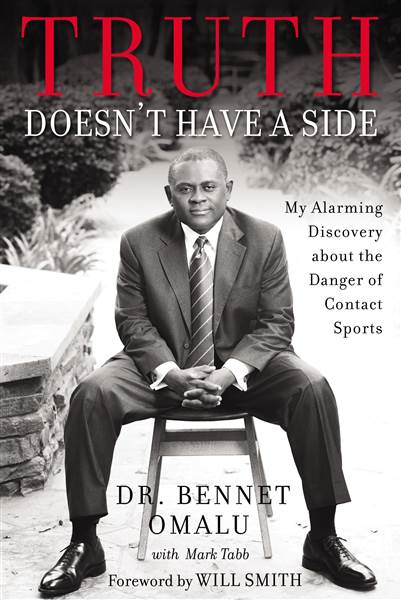 You wouldn’t let your child drink a glass of cognac or smoke a cigarette, so why would you send him out on a football field to risk brain damage?
You wouldn’t let your child drink a glass of cognac or smoke a cigarette, so why would you send him out on a football field to risk brain damage?
It’s a question Dr. Bennet Omalu — a forensic pathologist whose discovery of chronic traumatic encephalopathy was portrayed in the Will Smith film “Concussion” — wants parents to consider.
He warns that children who play football, hockey and lacrosse could face a lifetime of health consequences and details his findings in his new book, “Truth Doesn’t Have a Side: My Alarming Discovery about the Danger of Contact Sports.”
“We need to develop more brain-friendly, healthier types of sports,” Omalu told TODAY. “We have elevated sports to the level of a religion. We’re in denial of the truth.”
What do you want parents to know about contact sports?
Omalu: Knowing what we know today, there is no reason whatsoever that any child under the age of 18 should play the high-impact, high-contact sports.
The big six are: American football, ice hockey, mixed martial arts, boxing, wrestling and rugby. Blows to the head are intrinsic to the game. That truth could be inconvenient, painful and difficult, but we should not deny it.
What’s your view on lacrosse and soccer?
Omalu: Lacrosse has one of the highest concussion rates across all sports. It’s a very dangerous sport — people need to know that. I also don’t think kids younger than 18 should play it.
As far as soccer, there should not be any heading below the age of 18. Soccer is a high-dexterity, high visual-spatial coordination sport. You need very high levels of brain functioning to play it and children have not attained that level of brain development. Soccer as it’s played today should be played by only children who are above the age of 12-14. Children younger than that should play a modified form of soccer, whereby there’s less contact. Maybe we make the balls bigger and lighter so that there’s less accidental injury.
Which sports are safe for kids?
Omalu: The non-contact sports: swimming, track and field, volleyball, basketball, table tennis, lawn tennis, badminton — there are so many of them. There is still a risk of accidental injury. You have to play safe.
You’ve said letting kids play football is the “definition of child abuse?” How so?
Omalu: I take classes in child abuse recognition every few years in order to maintain my license to practice as a physician. The fundamental definition of child abuse is the intentional exposure of a child to the risk of injury. That injury does not have to occur.
We wouldn’t give a child a cigarette to smoke because a cigarette is potentially harmful. But we would put on a helmet on the head of a child and send him out on a field to play a game whereby he sustains repeated blows to his head, to suffer sub-concussions and concussions.
Which is more dangerous: a cigarette or a concussion of the brain? A concussion of the brain, of course. If that is not the definition of child abuse, what is it?
When people hear the statement “Omalu says playing football is child abuse,” they become emotional. But when you remove the emotionality, it’s a very objective statement. I’ve not met any parent who disagrees. Some parents will say, “Don’t put it like that; that makes me feel bad.”
What are the health consequences if a child suffers a concussion?
Omalu: Many papers have shown that all it takes for your child to suffer brain damage is just one concussion. But before your son suffers a concussion, there must have been hundreds if not thousands of sub-concussions. The damage is permanent because the brain does not have any ability to regenerate itself.
There were two papers that came out of Sweden, one in 2014 and another in 2016. Researchers identified 1.1 million children and they followed them for 41 years. They found out that if a child suffers just one concussion that brings him to the hospital, that child is more likely to die before the age of 42, especially through violent means; he has a two to four times increased risk of committing suicide as an adult; and is about two to four times more likely to suffer a major psychiatric illness as an adult, including major depression.
He is more likely to have diminished intelligence and is more likely to be less gainfully employed as an adult. He is more likely to become a drug addict or alcoholic; and is more likely to engage in violent or criminal behavior.
What about playing these high-contact sports when you’re over 18?
Omalu: Your brain becomes fully developed at about 18-25. I would be the first to defend your right to do whatever you want as an adult as long as it doesn’t pose a threat to the life of another person. That doesn’t mean it’s safe.
Children have not reached the age of consent. We are having fewer children so our children are becoming more precious. My son is almost 8 years old and he’ll be the first to tell you that football is not good for your brain.
[“Source-today”]
